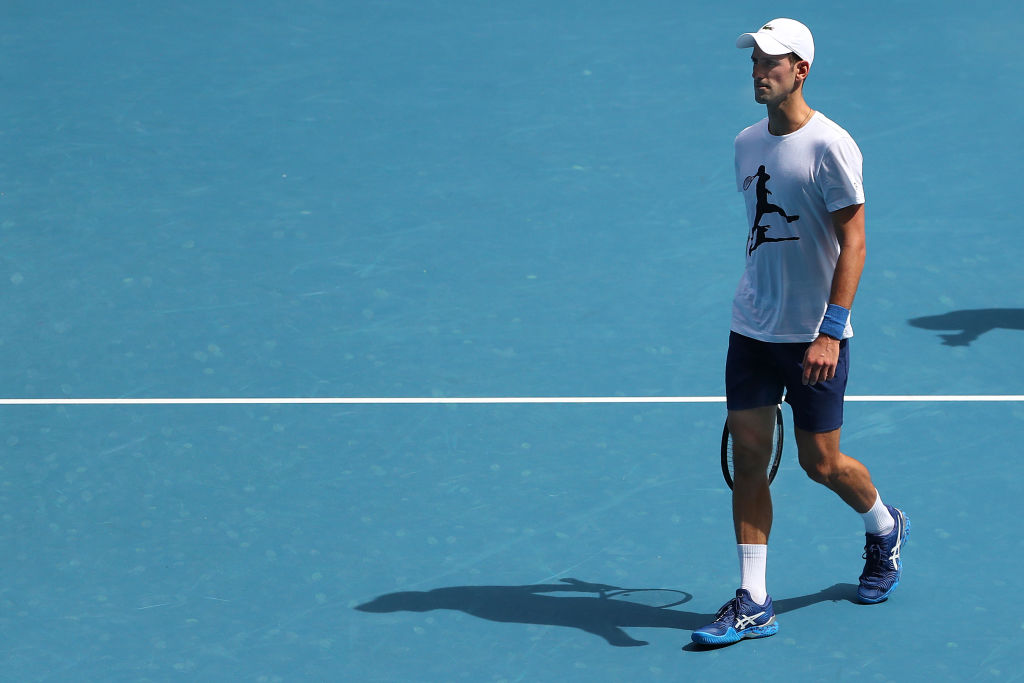Djokovic trains while under investigation in Australia 1:20
(CNN) -
Tennis star Novak Djokovic admitted on Wednesday that he did not immediately isolate himself after testing positive for COVID-19 last month, but denied that he knew he had the virus when he attended various public events.
In a statement posted on social media, he also apologized for an apparently false travel statement.
He said a member of his team had submitted it on his behalf in what he called "human error."
Novak Djokovic is "the best player in the history of men's tennis", but leaves a "complicated" legacy off the courts
In the middle of the controversy
Djokovic has been in the midst of controversy since he was detained in Australia last week over a dispute over visas and vaccines.
He arrived in Melbourne last week and had his visa quickly canceled for entering the country without a valid waiver for the vaccination requirement for all visitors.
But on Monday he won the legal battle when a judge ruled that he should be allowed to stay.
But questions persist about Djokovic's behavior.
Specifically for his positive covid-19 diagnosis last month before arriving in Melbourne and the public events he attended then.
"I want to address the ongoing misinformation about my activities and attendance at events in December in the lead up to my positive PCR test for covid-19," he said in the statement.
advertising
"This is misinformation that needs to be corrected, particularly in order to alleviate a broader concern in the community about my presence in Australia, and to address issues that are very painful and troubling to my family.
"I want to emphasize that I have worked very hard to ensure everyone's safety and my compliance with testing obligations."
Pepper spray and protests: Djokovic's departure from the hotel 2:21
The events Djokovic attended
Djokovic said he attended a basketball game in Belgrade, Serbia, on December 14, where many people tested positive afterward.
He showed no symptoms, but was tested on December 16.
On December 17, before receiving the official result of his test, he had a rapid test that came back negative.
He then attended a youth tennis awards ceremony, after which he received the official positive result, according to his statement.
The next day, December 18, he did a media interview and photo shoot.
He said he went ahead with the commitment because "he did not want to disappoint the journalist."
He added that he kept his social distance and that he wore a mask, except for the photoshoot.
"While I went home after the interview to isolate myself for the required period, on second thought, this was an error in judgment and I accept that I should have rescheduled this engagement," he said.
After news of his positive test emerged, Djokovic received widespread criticism for photographs showing him at such events, often without a mask and in the presence of minors.
Contradiction
His statement on Wednesday that he did not find out about his positive for covid-19 until December 17 also contradicts some comments from his brother.
He told a news conference Tuesday that the player tested positive on December 16 and knew his result.
In an interview with Australian broadcaster and CNN Seven Network affiliate on Wednesday, Djokovic's mother said she "probably" didn't know she had tested positive before attending the events.
Even the Serbian authorities, who vigorously defended Djokovic and denounced his temporary detention throughout the ordeal, acknowledged the controversy.
"It would be a clear violation of the rules because if you know that you are positive you would have to be isolated," Serbian Prime Minister Ana Brnabić told the BBC.
But he added that "there is a gray area" because it was not clear when Djokovic received his results.
Travel declaration
Djokovic also addressed the controversy over an apparently false travel statement.
Although he said he had not traveled in the 14 days prior to his arrival in Australia, photographs taken during that period appear to show him in both Spain and Serbia.
In the statement, he apologized for the false statement, which he said had been sent "by my support team on my behalf."
He said this was "human error and certainly not deliberate."
He declined to comment further, adding only that he hoped to play at the Australian Open and "compete against the best players in the world."
The penalty for submitting a false travel declaration carries a maximum penalty of 12 months in prison, according to the Australian Department of the Interior website.
Although the judge allowed Djokovic to go free and train for the tournament, which begins next week, the tennis star could still face deportation.
The Australian Border Force is investigating the discrepancy in the travel declaration and the immigration minister is still considering the possibility of removing him from the country
"As publicly noted, Minister Hawke is considering canceling Mr. Djokovic's visa under section 133C (3) of the Migration Act," a spokesman for immigration minister Alex Hawke said Wednesday.
"Mr. Djokovic's attorneys recently provided extensive additional submissions and supporting documentation said to be relevant to the possible cancellation of Mr. Djokovic's visa. Naturally, this will affect the timeframe for a decision."
Although the judge overturned the cancellation of Djokovic's visa, Hawke could still exercise his personal power to revoke it, which could lead to another legal confrontation.
Australian Open 2022Novak Djokovic

